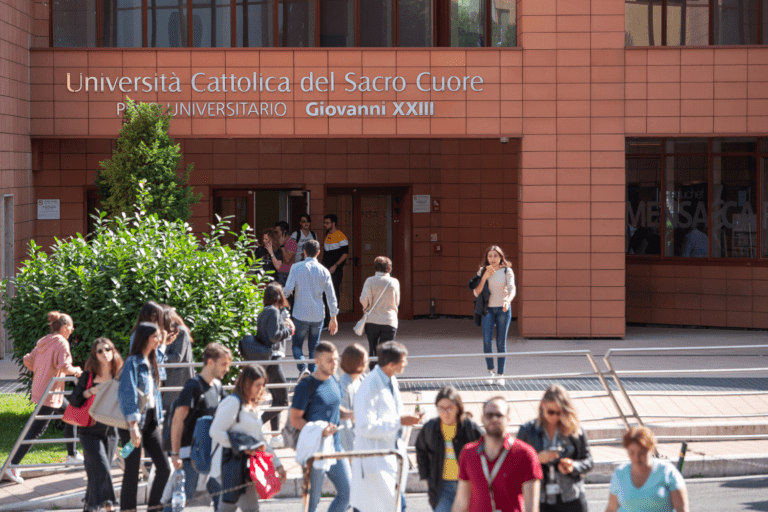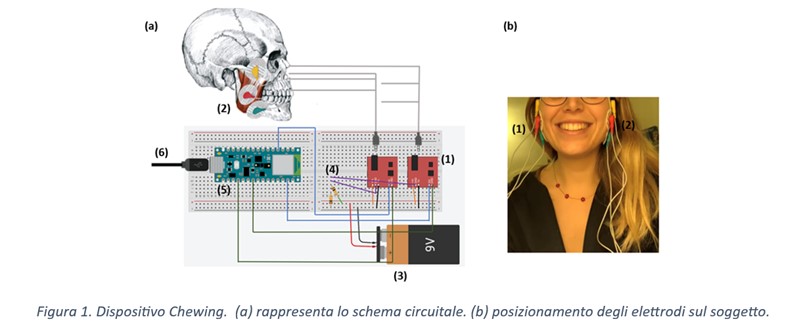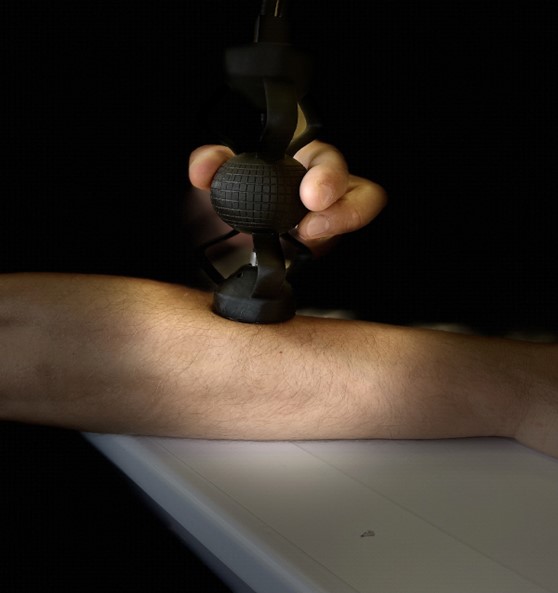Among MFR2023 prestigious partnes, also Università Cattolica del Sacro Cuore
Diverse and extremely interesting projects awaits the visitors of the 2023 Edition of Maker Faire Rome in pav. 6 “RESEARCH”
Founded by father Agostino Gemelli in 1921, Università Cattolica del Sacro Cuore is Europe’s most important Catholic University and, in addition to its evolving global reputation, it is also the only Italian university to boast a national network with its five Campuses in Milan, Brescia,Cremona, Piacenza and Rome, where is also located the “Policlinico Universitario A. Gemelli”.
Università Cattolica’s didactic profile is extensive and varied: 12 Faculties, almost 100 academic programmes – undergraduate, graduate and single-cycle graduate degree programmes – and a wide range of postgraduate programmes to provide top-class education for a total of 40 thousand students. The international dimension is also guaranteed due to numerous degree programmes taught in English and the large number of foreign exchange students who choose Università
Cattolica for its esteemed academic reputation. Young Italians are given the opportunity to set out from the five University campuses to further their studies in foreign universities. In addition to its departments, centres and institutes, the University has five University Centres for the design, development and implementation of research, training and intervention projects on topics of particular strategic importance such as, for example, Bioethics, International Solidarity and Family
Studies.
Università Cattolica del Sacro Cuore at Maker Faire Rome 2023
At the eleventh edition, Università Cattolica will present the following Projects within Pavilion 6 “RESEARCH”:
CHEWING
You are how you eat. Introducing an innovative tool for creating personalized chewing patterns, crucial for digestion and overall well-being. Gain insights into your chewing style, optimizing your health. The aim of this project is to underline the fundamental role of chewing for our general well-being and for efficient digestion of food. Through the use of "Chewing", an innovative device, it is possible to obtain individual chewing patterns to improve health and eating habits.
REACT – Heartbeat Dynamics Monitor
VO2 is a commonly used index to notify users about their fitness level, which cannot provide accurate assessments when measured with wearable devices, due to the low quantity and quality of recorded data. To overcome this problem, we developed REACT, a biosignal processing method based on artificial intelligence algorithms, to characterize real-time heart rate dynamics while providing a personalized tool to support training and reducing cardiovascular risk.
NEUROSCENT: Objective Olfactory Assessment through Machine Learning based
Classification of Electroencefalograpich Measurements
NEUROSCENT is a device for objective olfactory assessment using Ml-based classification of EEG measurements. EEG signals acquired through a wearable EEG device are transmitted wirelessly for real-time analysis. Deep learning models like CNNs and RNNs extract features from EEG signals, training a classification model to differentiate olfactory responses. NEUROSCENT provides quantifiable, real-time assessment, aiding in healthcare, food industry, and environmental monitoring.
SKID – Skin care detector: a tool for personalized cosmetics
Skin is the organ responsible for protecting us from external agents (i.e. radiation or pollutants) whose state of health can be maintained using specific cosmetics. Characterizing the skin biotype is complex and expensive, and therefore the type and effectiveness of cosmetics are individually evaluated empirically. We have therefore created SKID, a tool which, by analyzing the light emitted by the skin, is able to detect quantitatively, quickly, and at low cost its functional characteristics, identifying the skin biotype and following its modifications over time.
SPEAK UP!
The purpose of our presentation is to raise awareness of voice and hearing disorders and to make people aware of new technos in the service of prevention and early diagnosis on a large scale.
LONGEVITY CHECK – UP (LOOK UP 7+) – Assessment of the 7 cardiovascular healthlogie metrics and muscle performance
The Longevity Checkup project (LOOK UP 7+) is a prevention initiative that consists of assessing, in subjects outside the hospital setting, the 7 cardiovascular health metrics (smoking, physical activity, nutritional status, BMI, blood pressure, total cholesterol and blood glucose – measured by capillary blood sampling) and muscle mass and performance (Hand Grip Test, Calf Circumference, Chair Stand Test). Participants receive a 'report' assessing their lifestyle and tips about how to improve individual goals.
Molecular gastronomy: The role of sodium alginate as thickening agent
Molecular gastronomy represents a new field combining technical, artistic, and social components in the creation of novel foods. Unlike traditional Food Science, molecular gastronomy is focused on applying scientific principles to enhance understanding of process at a molecular level. Notably molecular gastronomy makes extensive use of hydrocolloids in the creation of novel foods through spherification reactions. Therefore, the project here presented explores the role of sodium alginate as thickening agent to produce cola caviar and molecular cheese, with the final aim to better understand the secrets of these innovative research applications.
Microplastics in Soil: The Unseen Adversary
Microplastics, tiny fragments of plastic measuring under 5mm, have emerged as significant environmental pollutants in recent years. Within agriculture, the soil can become repositories for these particles through the application of fertilizers, composts, wastewater, and other products that might inadvertently carry them. Such accumulation can detrimentally affect the soil's fertility, structural integrity, and microbial activities, thereby endangering plant health and jeopardizing food production. The project seeks to spotlight these microscopic pollutants, presenting their degradation process. Moreover, it showcases bacteria uniquely adapted to thrive on plastic surfaces, delving into their distinct traits.
Introduction to the plant pathology: focus on Grape disease and the concept of quarantine pests
Activities presented are an introduction for young and children to some concepts of plant pathology in a playful way.
The concepts of disease and pathogen will be introduced, and together with the young visitors we will investigate how infections occur in plants. Thanks to a short guessing game, children will guess the most important grape diseases thanks to symptoms and pathogens’ characteristics. Pathogens modes and factors to infect are shown ex. xylem structures (in the carrot they are easily visible).
Linked to that disease caused by Xylella (which infects through xylemic structures) will be introduced in a simple way. From here the suitcase game will be developed to introduce the concept of quarantine pathogens. the children will have to decide which items they can put in their suitcase, making sure that they do not import alien pathogens to their destination.
You can follow the activity of Università Cattolica on their social outlets on Twitter, Youtube, Facebook, Linkedin, Instagram and the official website. But you can also visit their area at Maker Faire Rome 2023, pad. 6 “RESEARCH”
Maker Faire Rome – The European Edition has been committed since its very first editions to make innovation accessible and usable to all, with the aim of not leaving anyone behind. Its blog is always updated and full of opportunities and inspiration for makers, makers, startups, SMEs and all the curious ones who wish to enrich their knowledge and expand their business, in Italy and abroad.
Follow us, subscribe to our newsletter: we promise to let just the right content for you to reach your inbox.






















































































